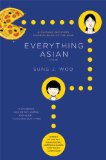Book Club Discussion Questions
In a book club? Subscribe to our Book Club Newsletter!
For supplemental discussion material see our Beyond the Book article, 100 Years of Korean Immigration and our BookBrowse Review of Everything Asian.
Please be aware that this discussion guide will contain spoilers!
- In the prologue we see our narrator, David Kim, reminiscing about the recently demolished Peddlers Town. His sister, Sue, joins him at the site for a kind of impromptu commemoration. At the end of the section, David says, "I sit back, close my eyes, and remember." Though we never return to this present-tense present, how does the retrospective frame enrich the novel?
- In Sook to Noona to Susan to Sue. Across the book, each member of the Kim family changes. How does the new culture they have to navigate accelerate their transformations? Who changes the most? The Kims take on American attributes, but don’t leave their Korean culture behind entirely. Which changes does the author portray as losses, and which as gains?
- All comedy is observational. Part of the fun of Everything Asian is how bizarre the Kims find their new world, New Jersey, and how they attempt to make sense of it. Where and how does the author take advantage of these opportunities for satire?
- The structure of Everything Asian is unusual. David is our narrator, yet in between his first-person chapters we get third-person tales of not just his family members but also their fellow merchants at Peddlers Town. Who narrates these stories and why?
- Often the younger Kims seem to operate in a completely different world than their parents. How does the author use David’s first-person narrative to play up the way the two generations approach America?
- Early on, David sees his father as a loser. Could the same tag apply to the other merchants of Peddlers Town? To all the people in the novel? In a land that reveres success, what are the personal consequences of failure?
- "Girls have to be bold," In Sook/Noona/Sue says. How does she seize the role of American woman, as opposed to her mother? How does her mother break from the traditional Korean roles of wife and mother?
- So often the individual relationships within the Kim family seem irrevocably broken, yet the family perseveres, mysteriously reconstituting its bonds. This may be the greatest accomplishment of the novel. How does the author show the various family members moving from bitterness and anger back to acceptance and love?
- Generally epigraphs come at the beginnings of books. How would Sherwood Anderson's famous line from Winesburg, Ohio function differently if it preceded the novel? How does it apply to the Kims? To the residents of Peddlers Town?
Unless otherwise stated, this discussion guide is reprinted with the permission of St. Martin's Griffin.
Any page references refer to a USA edition of the book, usually the trade paperback version, and may vary in other editions.
